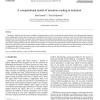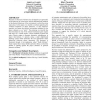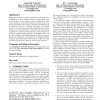173 search results - page 20 / 35 » Towards Artificial Systems: What Can We Learn from Human Per... |
RAS
2006
13 years 7 months ago
2006
Imitation in artificial systems involves a number of important aspects, such as extracting the relevant features of the demonstrated behaviour, inverse mapping observations, and e...
ACMACE
2006
ACM
14 years 1 months ago
2006
ACM
Research in Interactive Narrative has developed new approaches to the behaviour of virtual actors, but has dedicated little attention to the physical behaviour of the environment ...
HRI
2007
ACM
13 years 11 months ago
2007
ACM
Efforts are underway to make it possible for a single operator to effectively control multiple robots. In these high workload situations, many questions arise including how many r...
IIE
2007
13 years 7 months ago
2007
LOGO has been evolving in incremental steps for 40 years. This has resulted in steady progress but some regions of the space of all programming languages for children cannot be re...
EWCBR
2004
Springer
14 years 1 months ago
2004
Springer
By design, Case-Based Reasoning (CBR) systems do not need deep general knowledge. In contrast to (rule-based) expert systems, CBR systems can already be used with just some initial...



